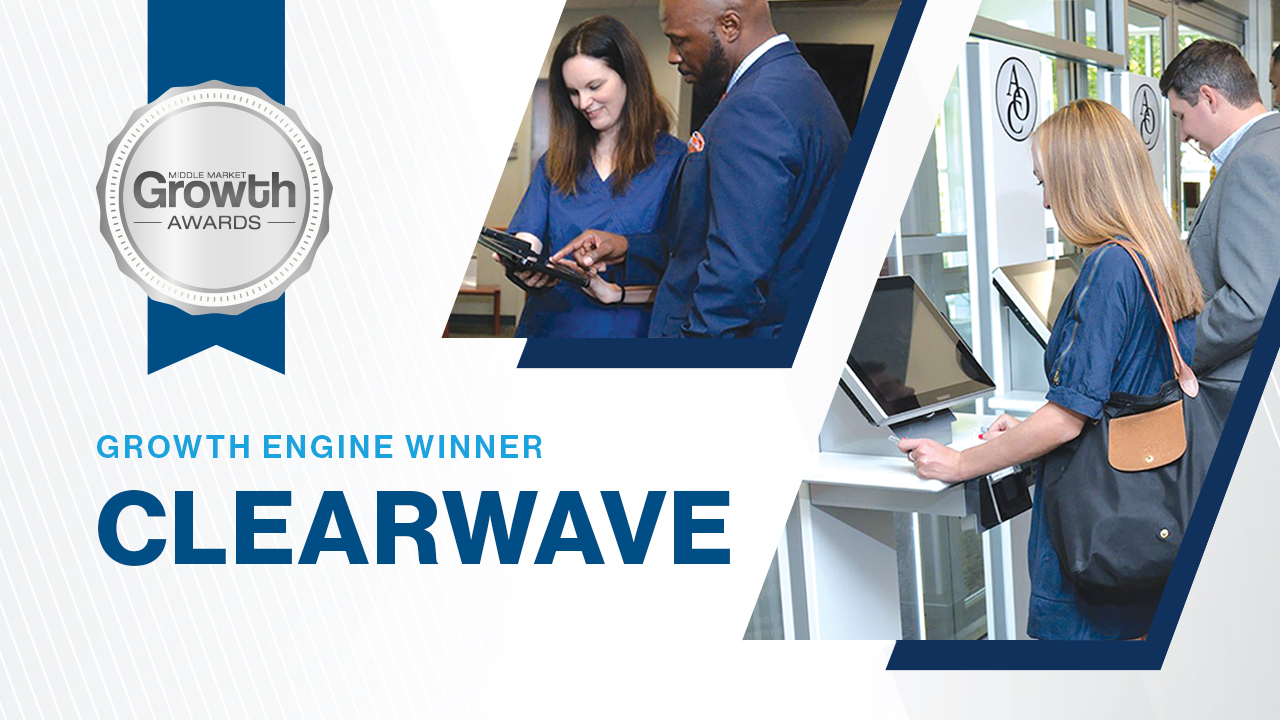MMG Growth Engine Award Winner: Clearwave
With the help of private equity partner Frontier Growth, health care software provider Clearwave developed a strategy that helped boost organic growth and M&A.

This story originally appeared in the Spring 2021 print edition of the Middle Market Growth Awards Special Report. Read the full report in the archive.
Many health care practices still rely on paper to track critical information for patients and financial records, but Clearwave is working to change that. Its software platform handles tasks such as patient scheduling and patient intake, and automates insurance eligibility verification. With a customer base that includes independent and hospital-affiliated physician practices, the company aims to create more efficient processes that help practices grow. That goal has bolstered Clearwave’s own success during the past year, thanks to its partnership with Frontier Growth, a private equity firm based in Charlotte, North Carolina.
When the PE firm invested in Atlanta-based Clearwave in March 2019, it helped develop a comprehensive strategy to boost organic growth, increase Clearwave’s capabilities through highly targeted M&A and expand the product line by closely examining customer needs, says Roberto Muñoz, operating partner at Frontier Growth and board member at Clearwave. “We worked hard to look at the fast-evolving market and think through how we could stay a step ahead of our competition and wow our customers,” he says, noting Clearwave’s gross retention and net retention are about 95% and 106%, respectively. “We are not only growing faster than our competition, but we also have raving customer fans,” says Muñoz.
A long list of metrics highlights Clearwave’s growth from 2019 to 2020—including a 52% increase in contracted annual recurring revenue (to $17.5 million), a 126% increase in bookings (to $7.2 million) and a 36% increase in staff (to 91 employees).
As part of the initial steps to fuel that growth, Frontier and Clearwave prioritized a small list of key initiatives, including the development and execution of a focused go-to-market strategy. This involved clearly identifying the handful of target segments that Clearwave wanted to dominate, and creating ideal customer profiles within each one.
To help Clearwave focus on these specific target segments and ideal customer profiles, Frontier supported improvements in the company’s sales and marketing efforts.
When Frontier made its initial investment in 2019, Clearwave had a small, highly entrepreneurial sales team—but like many growth-stage companies, the team lacked focus and capacity. To address this, the leadership team created clear territory plans, success metrics, training programs and KPIs. This enabled sales to operate more effectively, establish best practices and hire the right team members to deliver on its strategy.
We worked hard to look at the fast-evolving market and think through how we could stay a step ahead of our competition and wow our customers.
Roberto Munoz
Operating Partner, Frontier Growth and Board Member, Clearwave
Investments in marketing also played an important role in accelerating pipeline creation. Historically, Clearwave’s pipeline came primarily from inbound leads and trade shows, with little additional marketing effort to drive new business. To accelerate organic growth in 2020, Clearwave’s leadership team knew that marketing would be an essential component. The company hired an experienced vice president of marketing who developed and executed an integrated strategy, which included digital demand generation, advertising, thought leadership, social media and targeted outreach.
By listening more closely to customer needs, Clearwave increased sales opportunities.
In 2019, the company only offered a kiosk check-in solution. That changed in 2020, when Clearwave expanded its product offering to also include tablets and a mobile solution. By allowing customers to choose the modality that best suited their patient needs, Clearwave was able to appeal to a much larger audience.
In addition, the company expanded its suite to a robust digital patient-engagement platform by adding patient scheduling software through the acquisition of Odoro in late 2020. By combining Odoro’s extensive patient scheduling functionality with Clearwave’s award-winning digital check-in technology, Clearwave improved its ability to help customers improve efficiency and cost savings, as well as patient engagement and satisfaction.
Clearwave CEO Mike Lamb points to the Odoro acquisition as an example of how the partnership with Frontier helped fuel growth. “Frontier worked closely with us over the past year, understanding the market and doing research and diligence on several potential deals,” Lamb says. “When we found the right one with Odoro, Frontier worked tirelessly to help achieve a successful outcome and close the deal. The platform helped us immediately recognize new incremental revenue in Q4 of 2020 and has driven tremendous pipeline interest from our clients and prospects.”
Another high-priority initiative in 2020 was the transformation of Clearwave’s pricing—from an old model of one-time hardware costs and monthly software support fees to a fully SaaS subscription model. This new pricing approach was more customer-centric, and allowed flexibility that fit well with budgets and buying processes, according to Muñoz. “Our customers have raved about the new pricing format, and it has been a catalyst for our great financial results,” he says.
That winning pricing strategy was a meticulous initiative, and it was part of a team effort that included Frontier Co-Founding Partner Andrew Lindner, Vice President Tim Bechtold, as well as third-party SaaS pricing experts.
Although introducing the new pricing model came with risks outside of the company’s control, the team’s intuition ultimately proved to be right.
“Outside of COVID-19 challenges faced by most companies, our biggest challenge last year was implementing a completely new pricing model,” Lamb says. “We were confident we had made the right choice, but pricing pivots can be unpredictable. Fortunately, the model worked terrifically and improved our average deal ARR (annual recurring revenue) by over 50%.”


